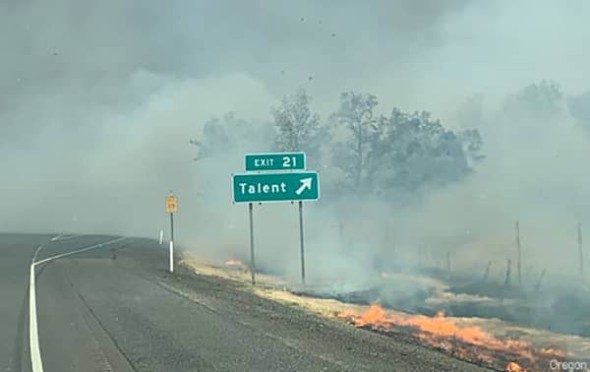Preparing for Fire Season and Power Outages
Posted on May 18, 2021 by Bob Jenks
Tags, Energy

It is springtime. That means it is time to pick asparagus and plant tomatoes. But it is also time to prepare for what follows spring: Fire Season. In recent years, Oregon’s summers have become longer, drier, and hotter, leading to wildfires. Last year, in a marked departure from our typical prevailing winds, we also saw strong, dry winds from the East that led to the Labor Day fires.
Experience shows us that wildfires often cause electricity outages and, after the events of recent years, we now know that electric transmission and distribution systems can cause wildfires. This has led to proactively shutting off power to communities to protect them from a wildfire started by electrical equipment. Shutting off power during fire season is itself a hazard, however, as this can shut down cell phone service, hinder emergency response, and endanger the health of residents who need home cooling and electricity access to manage certain medical conditions.
The risk of wildfires is significant this year. April was extremely dry and nearly all of Oregon is considered abnormally dry, with parts of Southern and Central Oregon in a state of extreme or exceptional drought.
Utilities and Regulators Are Preparing
Last September, during a period of extreme wildfire risk, Portland General Electric (PGE) shut off power in the Mt. Hood corridor to ensure that its electric system did not cause additional wildfires. This is called a Public Safety Power Shutoff (PSPS) and is designed to keep communities in high-risk areas safe by proactively shutting off electricity during extreme and dangerous conditions that might lead to the electric system igniting a catastrophic wildfire.
The PUC is in the process of putting forth temporary rules to establish requirements for utility reporting of fire-related incidents and protocols for communication, community education, and coordination with community partners before, during, and after implementing a PSPS. Because rules are needed this summer, the PUC is moving forward with temporary rules that can be put in place quickly, while permanent rules are developed for future years.
The rules generally require utilities to work with local jurisdictions and community partners to develop and maintain critical infrastructure and contact information for public safety partners; and to develop communication protocols to address the needs of vulnerable populations. The rules require utilities whenever possible to provide advance notice to people who may be affected by a PSPS. Utilities are to work with local emergency responders and public safety partners in implementing a PSPS.
Before implementing a PSPS, utilities must identify thresholds for wind events and the conditions that define an “extreme fire hazard.” Utilities must commit to the development of a statewide PSPS education campaign to ensure Oregon residents are aware of the risk of a PSPS.
It is clear to CUB from the development of these temporary rules that more work will be required before permanent rules are established. More work must be done to define what are critical facilities, who are vulnerable communities, and how utilities are required to work with communities that are threatened with a PSPS. Further, the rules should be informed by which areas of the utilities’ service territories are more fire-prone, and which areas are at the highest risk of coming under a PSPS. This information can help ensure that utilities, regulators, and stakeholders are able to work proactively with at-risk communities.
How You Should Prepare
In the meantime, customers should also be preparing in the following ways:
- Make sure that your electric utility has updated contact information for your household.
- If there is a household member witha medical condition that requires power, it is important to register with your utility and obtain a Medical Certificate.
- Prepare for an evacuation or outage by developing a plan and having food, medical supplies, and other necessary items ready.
- Download the FEMA app, which will alert you to real-time emergency alerts, and sign up for emergency notifications with your local city and/or county.
- You can also consider developing you own vegetation management program by establishing a defendable space around your home that is free of combustible material.
For further information, visit https://www.oregon.gov/puc/safety/Pages/Power-Outage-Prep.aspx.
To keep up with CUB, like us on Facebook and follow us on Twitter!





08/18/21 | 0 Comments | Preparing for Fire Season and Power Outages